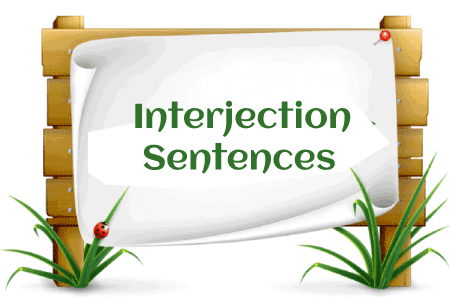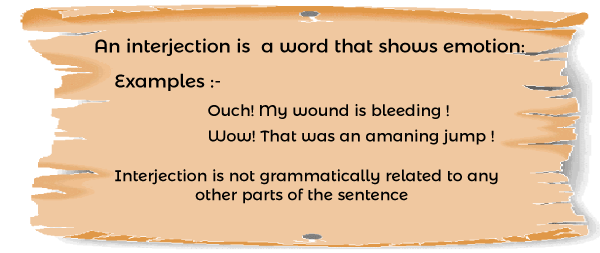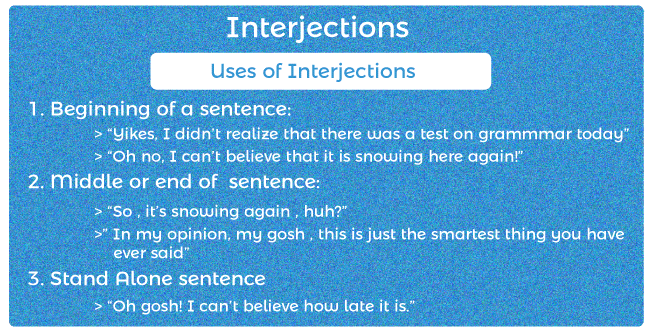Interjection SentencesInterjections are terms or phrases used to express a strong feeling or an unexpected emotion. Interjections are typically found in their own statements or at the start of a sentence accompanied by a comma. They contribute significantly to the dialogue by setting the tone of a conversation or expressing a character's feelings. 
Interjections are grammatically distinct from the words that surround them. That is, you cannot change an interjection with an adjective, and an interjection does not have to compose a whole phrase. In fact, removing an interjection from a statement will result in the statement remaining grammatically right. 
A part of a sentence is usually inked to another section of the sentence. Like verb requires a noun, whereas an interjection can stand on its own. It is not related to any other part in the statement. It has no effect, and nothing else will change the interjection. In fact, many interjections can function as their own phrase and do not require any other terms. The interjection is like the ruler of its own mountain. However, removing an interjection may modify the meaning of the statement or make it less expressive or intense. Interjections in Sentences: How to Use ThemInterjections can either begin a statement or be inserted into it. When an interjection begins a statement, it can be followed by a comma with the punctuation put at the completion of the sentence, or it can be quickly followed by a punctuation mark. When an interjection is used within a sentence, it must be separated by a comma.

In the middle of the sentences
Comma or Exclamation Mark in Interjection SentencesInterjections are commonly used with punctuations that show surprise, wrath, or perplexity because they are frequently emotional sentiments. Exclamation and question marks are often employed in speech because they are easy to communicate with through voice intonation. Exclamation marks in writing emphasize surprise, joy, and rage. Question marks can be used to elicit more responses, irony, suspicion, or perplexity. Even periods and ellipses can have a flat emotional effect that is misinterpreted as cynicism, boredom, or lack of interest. As an example:
Also, an exclamation mark has more impact and can be more impactful when used with the interjections. No! This is not my shirt ! Wow! This dress looks so gorgeous ! Hey! I am leaving for the office ! Usually, the exclamation mark after the interjection also has the exclamation mark at the ending of the sentence. Since it is simpler to communicate emotion when speaking, precise punctuation mark positioning is critical when using interjections in writing. Interjections must be positioned suitably with the correct punctuation to successfully portray emotions to a reader. This is particularly true when used within a statement rather than alone or at the end of one. Interjection Sentences Part 1
Interjection Sentences Part 2
For added emphasis, a few of these interjections can be separated by em dashes and an exclamation mark. This is a creative option available to writers. Let us take a closer look at two of those cases. I baked cookies, and-voila!-look at this work of genius ! Helen was taking a walk along when-bam!-she slammed into a doorframe . Let's ReviseInterjections are the terms that help your speech or writing come to life. When used alone to communicate emotions like surprise, skepticism, or uncertainty, the focus you place on them is critical. They also serve as good sentence starters or are integrated into sentences to help resolve tone or elucidate the surrounding topic.
Next TopicInterjection Worksheet
|
 For Videos Join Our Youtube Channel: Join Now
For Videos Join Our Youtube Channel: Join Now
Feedback
- Send your Feedback to [email protected]
Help Others, Please Share









